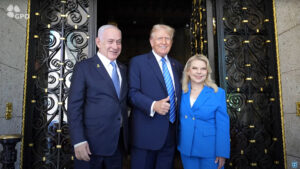Brussels–After holding the world in suspense for months, the US presidential elections finally ended with the re-election of Donald Trump. The vote counting is not complete, but from the partial results available Wednesday morning (Nov. 6), it is certain that the New York-based tycoon will cross, for the second time, the threshold of the Oval Office of the White House instead of the incumbent vice president, Democratic candidate Kamala Harris. It is the outcome that (almost) everyone on the other side of the Atlantic feared as it risks straining relations between Washington and Brussels once again, even though European leaders are already congratulating the newly elected president.
The partial results
We still lack the final results from five states – Alaska, Arizona, Maine, Michigan, and Nevada – but the final picture is already abundantly clear. With 277 delegates already secured versus the 224 for the Democratic challenger, the leader of the Republican Party (the Grand old party, as they call it in the US) can already say he is certain of re-election, for which he needed only 270. (Here we explain how the complex indirect voting mechanism works in the US).
The popular vote reflects the advantage of Donald Trump over Kamala Harris: over 71 million for the former and just over 66 million for the latter. Thus, after being the 45th president of the United States, Trump will be the 47th even though his formal nomination by the delegates to the Electoral College will take place in December. The inauguration is scheduled for January 20, 2025, a few days after the anniversary of the assault on Capitol Hill, which he fomented on January 6, 2021.
How did the election go
For the second time in US history, a former president won a second non-consecutive term (the previous one was Grover Cleveland, president from 1885 to 1889 and then from 1893 to 1897). For the second time, a female candidate lost, and both times to Trump (with Harris now, with Hillary Clinton eight years ago).
An important statistic to observe is that of endorsements. The GOP candidate did better than last time virtually everywhere: in every state, in every ethnic group, in every age segment of the population (with increases of as much as 12 percentage points, as in some counties in Florida). Of the seven swing states that were predicted to decide the outcome of the presidential race, the former White House tenant definitely won Georgia, North Carolina, Pennsylvania (the juiciest in terms of votes, with its 19 big voters), and Wisconsin, while he is ahead even in those where the counting is not yet over.

Most importantly, Trump managed to “flip” three blue states (i.e., Democratic) in the 2020 election round won by outgoing President Joe Biden, and turning them red (i.e., Republican-majority): Georgia, Pennsylvania, and Wisconsin, with Michigan about to join them. In short, in the so-called blue wall consisting of a dozen states that had represented as many Democratic strongholds since the early 1990s (albeit with some fluctuations in the last three elections) –significant holes emerged, opening the doors of the White House to the tycoon. Conversely, Harris fared poorly even in those districts where a Democratic victory was expected.
In addition to the presidency, there were elections yesterday to renew one-third of senators and the entire House of Representatives.. Republicans won a majority in the Senate (which will facilitate the process through which Trump will have to nominate members of the executive and judicial branches), while counting is still underway for the House, where the Democrats may still have some hope. If also that goes to the GOP, Trump will have Congress in his grasp at least until the next mid-term elections.
Reactions from Europe
Wednesday morning, Trump claimed victory during a rally in Florida, announcing the beginning of “a new golden age for America.” But already during the night between Tuesday and Wednesday, the first reactions from European leaders began to arrive. The president of the EU executive, Ursula von der Leyen, congratulated “warmly” the Republican candidate, stressing a willingness to “work together on a strong transatlantic agenda.”
She was echoed by the outgoing president of the European Council, Charles Michel, who reiterated how there is “an enduring alliance and a historic bond” between the US and the EU and how the “constructive cooperation” between Washington and Brussels should be maintained, “defending the multilateral rules-based system.” At the time of writing, there is no official communication from the head of EU diplomacy, High Representative Josep Borrell.
Congratulations to President-elect @realDonaldTrump.
& have an enduring alliance and a historic bond. As allies and friends, the EU looks forward to continuing our constructive cooperation.
The EU will pursue its course in line with the strategic agenda as a strong,…
– Charles Michel (@CharlesMichel) November 6, 2024
However, it is an open secret that most European chancelleries hoped for a Harris victory. Trump’s return to the White House can potentially change many things for Brussels in several crucial dossiers and at a particularly delicate international juncture. A change that would feel like a return to a past the EU had experienced with great difficulty and was more than happy to have left behind.
The consequences for the EU (and the world)
One of the biggest shocks will come in foreign policy. Starting with Ukraine, where for two and a half years, a war has been raging that the newly elected president has boasted he can end within 24 hours. Not surprisingly, one of the first reactions to the election came from Kyiv: “We continue to count on strong bipartisan support for Ukraine in the United States,” wrote on X Volodymyr Zelensky. His country “is committed to ensuring long-term peace and security for Europe and the transatlantic community, with the support of our allies,” he said. As if to say: we want to continue to defend ourselves, but we need Washington’s help, which, with Trump in the White House, cannot be taken for granted, given that the president-elect has made it widely understood that he aims to strongly reduce, or even completely stop, military and financial aid to Kyiv.
On the Middle East chessboard, a second Trump presidency will most likely mean that Israeli PM Benjamin Netanyahu will have carte blanche to continue his regional war, being able to count on the unconditional protection of the stars-and-stripes umbrella in any militant confrontation with the Jewish state’s many enemies. It explains the jubilant reaction of the Tel Aviv head of government to the Republican nominee’s “huge victory”: “Congratulations on the greatest comeback in history!” Netanyahu wrote on X. He added that such a “historic return to the White House offers a new beginning for America, and a renewal of the firm commitment to the great alliance between Israel and America.”

The US participation in NATO could also be in doubt, at least financially. Washington’s exit from the alliance appears remote for now. However, it is likely that in the next four years, Europe will have to structurally rethink its security in case Trump does not want to guarantee it in the face of, for example, the aggressive neo-imperialism of Russian President Vladimir Putin.
International trade will also take a hit because of the heavy duties that Trump said he would reintroduce on Made in China products and those from the Old Continent. It will be a problem for Germany, which lives off its exports, and also for Italy (for example, dairy exports). So much so that Prime Minister Giorgia Meloni immediately tried to patch things up, recalling the importance of transatlantic ties as EU leaders did and recalling how the two countries are “sister nations, bonded by an unshakeable alliance, common values, and a historic friendship” and a “strategic bond.”
Other areas where cooperation between Europe and the United States may soon come into crisis are in countering climate change (Trump in 2020 withdrew Washington from the Paris Agreement) and energy transition, given that the newly elected president is a proponent of the use of fossil sources and controversial extraction techniques such as fracking.
English version by the Translation Service of Withub







